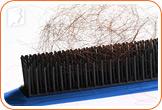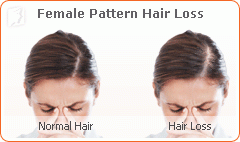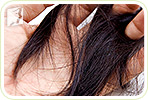It is true that some women will experience dramatic hair loss during menopause. The most common cause of hair loss in menopause is low thyroid function, which is common among menopausal women. Other causes include: changes in hormone levels, increased physical or emotional stress, or various medications - some of which may be taken to alleviate other menopause symptoms.
For more information about hair loss during menopause and cures for it, read on.
What Are The Symptoms of Hair Loss?
The following list indicates the most common symptoms of hair loss:

- Large amount of hair loss noticeable when washing
- Large clumps of hair being stuck in the brush
- The scalp becomes itchy, oily, or red
- The appearance of bald patches
If you experience one or even a couple of these symptoms, you may be suffering from hair loss. Keep reading for more information about hair loss symptoms.
What Are The Causes of Hair Loss?
Most people experience some hair loss naturally as they get older. But age, changing hormones and genetics cause some to lose more hair than others. The result can be partial or total baldness, known as alopecia.
Hair loss as a result of menopause is typically due to fluctuating hormone levels. The two core hormones involved in hair growth are estrogen and testosterone. Estrogen helps the hair grow faster, stronger, and healthier as well as stay on the head for long time, so when levels deplete, so does overall hair health. Some other causes are outlined below:

- Diet. Too little protein in your diet can lead to hair shedding, so can too little iron.
- Childbirth. Some women lose large amounts of hair within two to three months after delivery.
- Stress and illness. You may start losing hair one to three months after a stressful situation, such as major surgery. High fevers, severe infections or chronic illnesses can also result in hair loss.
- Alopecia areata. It is a condition in which hair loss occurs only in certain areas, resulting in hairless patches the size of a coin or larger.
- Thyroid disease. An overactive or underactive thyroid can cause hair loss.
- Ringworm. If this fungal infection occurs on your scalp, it can cause small patches of scaling skin and some hair loss.
- Medication. Certain medications used to treat cancer can cause your hair to fall out. But other prescription medications, such as blood thinners, antidepressants, and high blood pressure medications, can also cause hair loss, so can birth control pills and high doses of certain vitamins.
What Hair Loss Cures Are Available during Menopause?
Sometimes lifestyle changes, such as diet and exercise, can cure significant hair loss. Increasing one's intake of protein, vitamins, and iron all help. Exercise and stress reduction techniques, such as yoga or meditation, improve overall health, including that of the hair.
It is also beneficial to use alternative treatments that help to balance these hormones naturally. The most effective and safest solution is usually to combine lifestyle adjustments with alternative treatments.
Tips for Avoiding the Appearance of Embarrassing Hair Loss
- Wigs. If your hair loss is widespread, a wig may be a relatively inexpensive and easy option.
- Minoxidil. Now sold over-the-counter, it may help stop hair loss in some people. However, effectiveness varies, and you need to keep on using it to maintain benefits.
- Hair transplants. A new method, called micrograft hair transplantation, uses single hair grafts and has been successful in selected patients.
Click on the link below to learn more about hair loss treatments during menopause.
Sources
- Dr. McNair, Trisha.(n.d). "Hair Loss." Retrieved from www.bbc.co.uk.
- Mayo Clinic.(n.d)."Hair Loss." Retrieved from www.mayoclinic.com.
- The American Hair Loss Association.(n.d)."Women's Hair Loss." Retrieved from www.americanhairloss.org.



